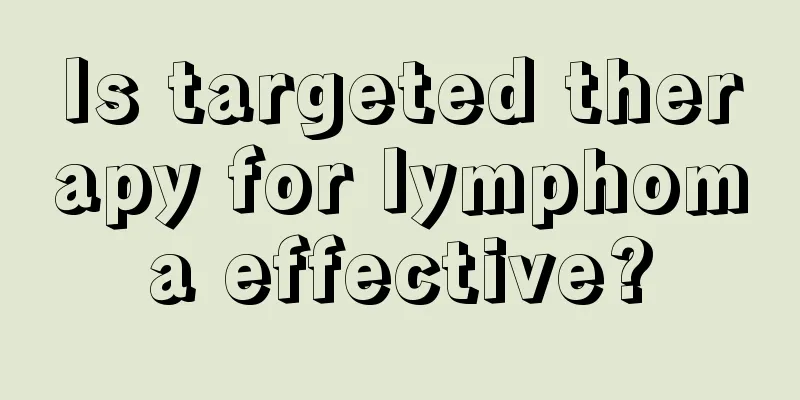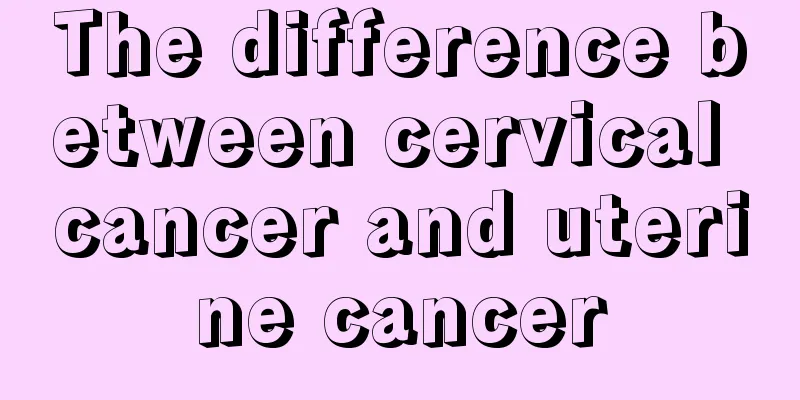Is targeted therapy for lymphoma effective?

|
Maybe you are not very familiar with lymphoma, but when you hear this name, you can imagine its seriousness, which is mainly due to everyone's fear of cancer. Malignant tumors are the most terrifying, especially those related to our immune system. They are very stubborn and difficult to cure, and everyone stays away from them. So, is targeted therapy effective for lymphoma? Are there any other methods? Lymphoma is a malignant tumor originating from the lymphatic hematopoietic system, which is mainly manifested by painless lymphadenopathy, hepatosplenomegaly, and all tissues and organs of the body may be affected, accompanied by systemic symptoms such as fever, night sweats, weight loss, and itching. Targeted therapy is to design corresponding therapeutic drugs at the cellular and molecular levels for the identified carcinogenic sites (the site can be a protein molecule inside the tumor cell or a gene fragment). When the drug enters the body, it will specifically select the carcinogenic site to combine and act, causing the tumor cell to die specifically without affecting the normal tissue cells around the tumor. Therefore, molecular targeted therapy is also called "biological missile". Our major domestic tumor treatment centers and specialized hospitals can test some targets of lymphoma, such as ER/PR, HER2 receptors, TP/DPD enzymes, etc., and carry out targeted treatment according to the test results. Such treatment is more personalized and the effect is usually satisfactory. In addition, due to the continuous emergence of new generation drugs, while effective treatment is provided, the adverse reactions to patients are also greatly improved. However, targeted therapy alone is not enough to fight lymphoma. Are there any other methods? Below I will explain to you from several aspects. 1. Chemotherapy. Chemotherapy for lymphoma is usually combined with targeted therapy drugs and biological agents. In recent years, chemotherapy regimens for lymphoma have been greatly improved, and the long-term survival of many types of lymphoma has been greatly improved. 2. Bone marrow transplantation. For patients under 60 years old, medium- and high-risk patients who can tolerate high-dose chemotherapy, autologous hematopoietic stem cell transplantation can be considered. Some young patients with relapse or bone marrow invasion can also consider allogeneic hematopoietic stem cell transplantation. 3. Surgical treatment. It is limited to biopsy or complication treatment. If there is no contraindication for hypersplenism and there is an indication for splenectomy, splenectomy can be performed to improve blood count and create favorable conditions for subsequent chemotherapy. In short, targeted therapy is effective for lymphoma, so patients can rest assured, and combining it with multiple therapies is a wise choice. |
<<: Chinese herbal medicine for treating lymphoma
>>: Lymphoma rehabilitation treatment methods
Recommend
How should patients with nasopharyngeal carcinoma be cared for after surgery
How should patients with nasopharyngeal carcinoma...
What are the dietary principles for ovarian cancer
Ovarian cancer is a disease that threatens women&...
What are the benefits of adding vinegar to hair washing
What are the benefits of adding vinegar to shampo...
Is the nose related to sexual function?
Harmonious sex life is very important for a famil...
The baby's face is red when he sleeps
There are many things that require special attent...
What causes pain when pressing on left ribs?
If you feel pain when pressing on your left ribs,...
How long is the best time to brush your teeth
Brushing your teeth can prevent bad breath and so...
What's the matter with cold soles of feet?
Cold soles of feet are more common among women an...
Will colon cancer recur after five years?
Will colon cancer recur after five years? Relevan...
Explore the possible complications after colon cancer surgery
Colon cancer is also a type of intestinal cancer....
Don't use these three types of mobile phone ringtones
When I was sleeping, I was startled by the sudden...
The harm of long-term drinking at night
Alcohol is very harmful to the human body, but so...
Can I drink homemade wine?
Wine actually has a very good health care effect....
Hereditary endometrial cancer
Hereditary endometrial cancer is one of the most ...
What is the cause of fatigue and drowsiness
Fatigue and drowsiness are very common in life. F...









